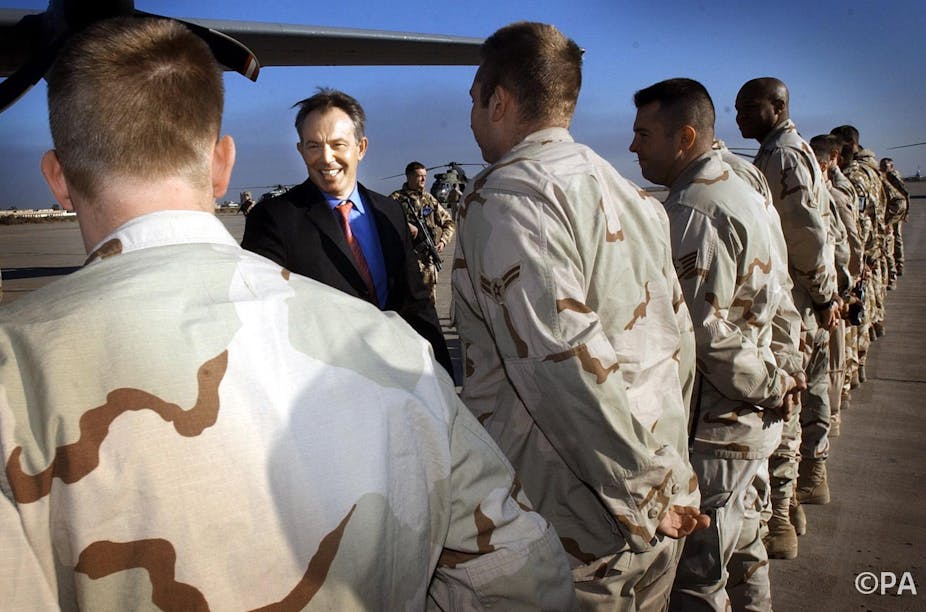The International Criminal Court (ICC)‘s reputation is on the ropes as it faces allegations of racism, imperialism and impotence. But there is a glimmer of hope for the international justice project: the court’s investigation into war crimes allegedly carried out by British forces during the Iraq War.
The investigation has the potential to reaffirm the Court’s credibility at a time when it faces dire new threats to its very survival at a time when it is arguably needed more than ever.
Working with the British law firm Public Interest Lawyers, the European Centre for Constitutional and Human Rights has presented a document to ICC prosecutor Fatou Bensouda, that British troops allegedly subjected Iraqi detainees to grave physical and psychological abuse, including beatings, sexual assault and constant threats of rape and death. The dossier contains evidence of what they say are more than 400 cases of mistreatment or unlawful killings.
Putting as powerful a country as the UK in the spotlight for charges of this magnitude will do a lot to prove that the Court is serious in its duty to hold the powerful to account, wherever they are and whoever they might be.
Compromised
The ICC has been often labelled as a tool for Western powers to project their sovereignty over weaker countries – and the Court has specifically been accused of toppling governments in order to install more pro-Western regimes. This issue arose in full force when the Court investigated Libyan leader Muhammar Gaddafi and Sudanese, Omar al-Bashir, de facto forcing them to yield power.
In particular, many African leaders recently accused the ICC of being racist for targeting only the African continent. Undoubtedly the Court has an African problem, since all the investigations that the ICC has opened to date concern African countries.
A similar situation emerged recently during the investigation into Kenyan president Uhuru Kenyatta, who became the first ever sitting president to face an ICC hearing. Unlike Bashir and Gaddafi, however, Kenyatta was able to exploit this investigation to sustain and consolidate his hold on power.
But the allegations of British war crimes in Iraq offers the ICC a potential textbook case, one that can clear some of the procedural hurdles and power politics that have so dragged it down in recent years.
Stepping in
Initially, Dominic Grieve, Britain’s attorney-general, claimed that: “where allegations have been made that individuals may have broken those laws, they are being comprehensively investigated”.
But the ICC’s decision to reopen the investigation can only mean that the UK is either unable or unwilling to prosecute such crimes. Indeed, the shielding of senior political and military figures has been a constant issue for the UK, and it seems nobody actually knows if the prime minister legally holds command responsibility for the armed forces.
Despite much theoretical back-and-forth over who should prosecute and who should be held accountable, the truth is that there is no sign of any domestic British investigation of the charges. This is precisely where the ICC is supposed to come in.
According to the Rome Statute, the funding treaty that underpins the ICC, the Court was created to help end impunity for perpetrators of the most serious crimes for the international community. The same treaty underlines that the Court is independent, implicitly rejecting accusations that is controlled by powerful states and organisations.
The problem is, the ICC is too dependent on its members for that to be technically true.
Witness the procedural issues that emerged when the ICC tried to open an investigation against the Assad government in Syria for its suspected use of chemical weapons in August 2014. In cases such these, where an investigation is expected to occur on the grounds of a non-member of the Rome Statute, the Court needs a referral from the Security Council of the United Nations. That leaves it dependent on the politics of the permanent, veto-wielding powers, such as Bashar al-Assad’s Russian and Chinese allies, to bring cases to trial.
Taking it to the top
But in the British case, things might just be different. The UK is not only a member of the ICC, having ratified the Rome Statute in 2001, it was also one of the Court’s staunchest supporters in the negotiations to set it up. That will make it hard for the British authorities to conspicuously dodge, block or delay an investigation, as many of the Court’s critics accuse Western countries of doing.
Whatever the verdicts ultimately are, successfully concluding the investigation against British troops will be vital to sustain the Court’s shaky legitimacy. Indeed, it is the main hope for the ICC’s survival. Because the Court lacks a direct executive system to implement its decisions, it has to rely on member states and organisations to action them – and that in turn leaves it dependent on member states’ continued faith in its credibility and impartiality.
Accusations of racism, politicisation and exploitation have badly damaged the ICC’s credibility. Thoroughly investigating the charges against British troops in Iraq gives one of the world’s most vital political institutions a chance to absolve itself of those.

